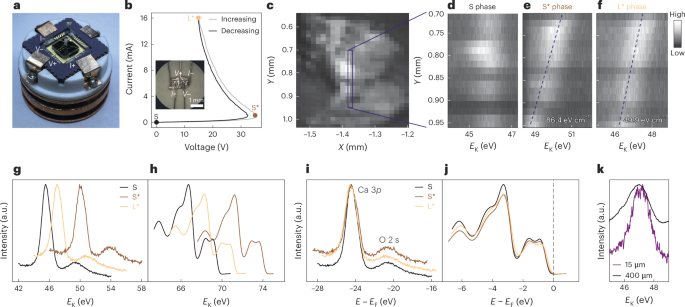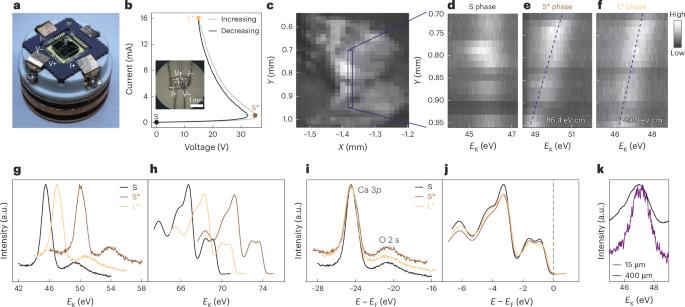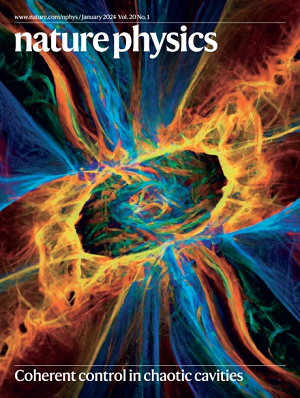Electronic response of a Mott insulator at a current-induced insulator-to-metal transition
IF 17.6
1区 物理与天体物理
Q1 PHYSICS, MULTIDISCIPLINARY
引用次数: 0
Abstract
The Mott insulator Ca2RuO4 exhibits an insulator-to-metal transition induced by d.c. current. Despite the thorough examination of the structural changes associated with this transition, a comprehensive knowledge of the response of electronic degrees of freedom is still lacking. Here we demonstrate current-induced modifications of the electronic states of Ca2RuO4. Angle-resolved photoemission spectroscopy in conjunction with four-probe electrical transport (transport-ARPES) measurements reveal a clear reduction of the Mott gap and a modification in the dispersion of the Ru bands. Based on a free-energy analysis, we show that the current-induced phase is electronically distinct from the high-temperature zero-current metallic phase. Our results highlight strong interplay of lattice- and orbital-dependent electronic responses in the current-driven insulator-to-metal transition. Ca2RuO4 is a Mott insulator that becomes a metal when a current is passed through it. Now, the changes in its electronic structure are revealed as this transition takes place.


电流诱导绝缘体向金属转变时莫特绝缘体的电子响应
莫特绝缘体 Ca2RuO4 在直流电流的诱导下表现出绝缘体到金属的转变。尽管对与这种转变相关的结构变化进行了深入研究,但对电子自由度的反应仍然缺乏全面的了解。在这里,我们展示了电流诱导的 Ca2RuO4 电子状态的改变。角度分辨光发射光谱与四探针电输运(transport-ARPES)测量相结合,揭示了莫特隙的明显减小和 Ru 带色散的改变。基于自由能分析,我们发现电流诱导相在电子学上与高温零电流金属相截然不同。我们的研究结果凸显了在电流驱动的绝缘体向金属转变过程中,晶格和轨道依赖性电子响应的强烈相互作用。
本文章由计算机程序翻译,如有差异,请以英文原文为准。
求助全文
约1分钟内获得全文
求助全文
来源期刊

Nature Physics
物理-物理:综合
CiteScore
30.40
自引率
2.00%
发文量
349
审稿时长
4-8 weeks
期刊介绍:
Nature Physics is dedicated to publishing top-tier original research in physics with a fair and rigorous review process. It provides high visibility and access to a broad readership, maintaining high standards in copy editing and production, ensuring rapid publication, and maintaining independence from academic societies and other vested interests.
The journal presents two main research paper formats: Letters and Articles. Alongside primary research, Nature Physics serves as a central source for valuable information within the physics community through Review Articles, News & Views, Research Highlights covering crucial developments across the physics literature, Commentaries, Book Reviews, and Correspondence.
 求助内容:
求助内容: 应助结果提醒方式:
应助结果提醒方式:


